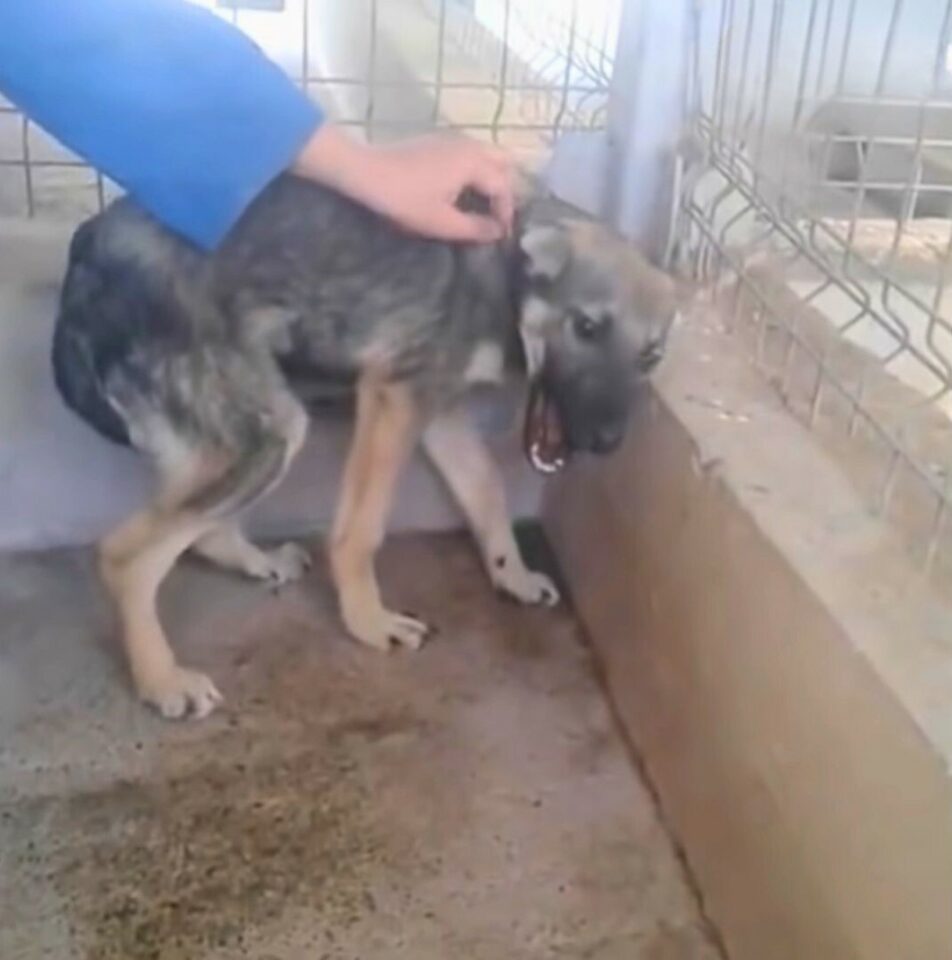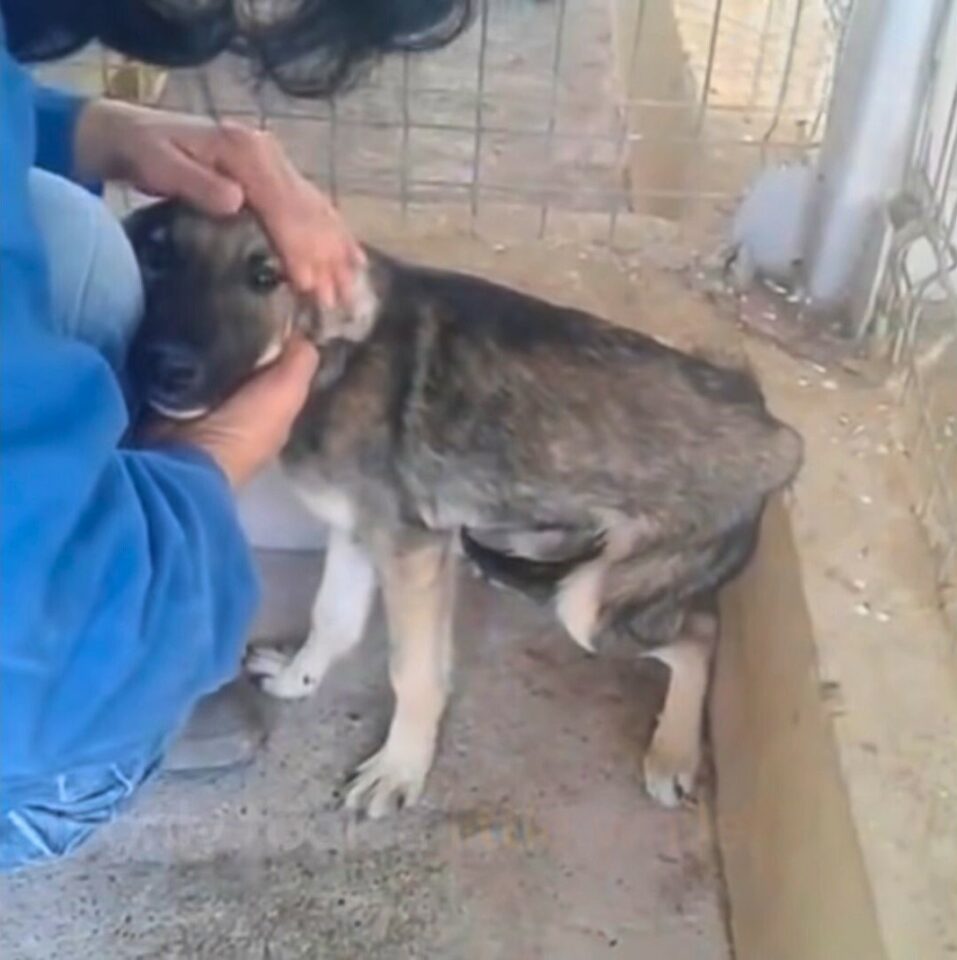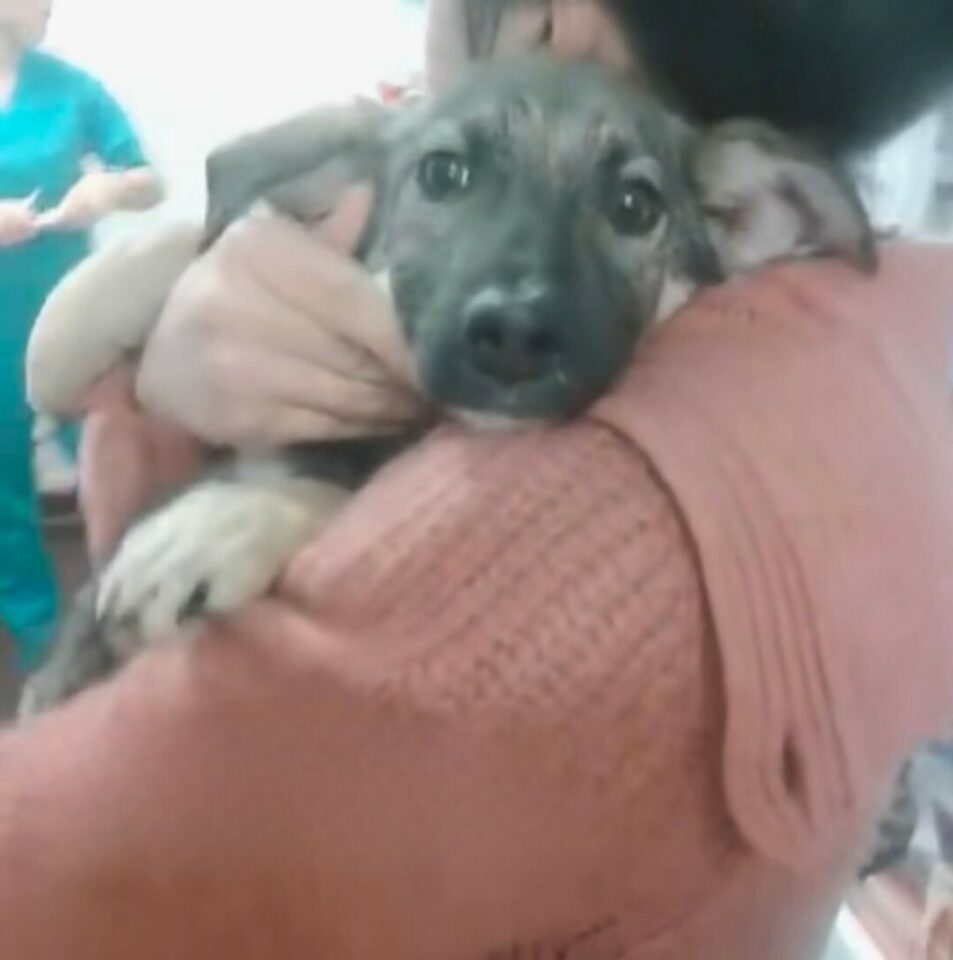Improper parenting and neglecting our dogs’ needs can lead to severe anxiety and phobia. That’s exactly what happened to Kanye, a dog that suffered from severe anxiety when he was brought to a shelter.
His previous owners neglected Kanye in the most obvious way. I can’t even imagine what poor Kanye has been through, as he was extremely stressed out the first time he was approached in his crate.
Kanye Didn’t Trust People

Even though he didn’t bite nor show any signs of aggression towards Monica, Kanye was extremely loud in his crying. He was trying to avoid her touch at all costs probably because it reminded him of previous owners hitting him.
The little Kanye, who was still a puppy, avoided interaction and socialization with other dogs. All he wanted to do was be alone, far away from people.
This is a quite common pattern in dogs that have been through extreme trauma. They have a hard time adapting to new circumstances and new people, and most of the time, their behaviour is lethargic.
Some even refuse to eat or drink, as they don’t feel safe enough to approach food in front of people.
The Caretaker, Monica, Came To The Rescue

Luckily, the shelter caretaker, Monica, was there to save little Kanye from himself.
Even though he was extremely terrified when she first approached him, her gentle touch was something new for him.
After a few moments of her petting Kanye, he stopped screaming excessively and let it go. Turns out all Kanye needed was a humane, gentle approach, and a little love. After all – don’t all dogs deserve that?

It took him some time, but Kanye’s progress was gradually improving. Throughout time, he overcame his fear of other people.
He’s now a confident, happy boy who loves playing around with his mates, and he truly enjoys his relationship with Monica.
If you’ve ever found yourself drifting off to sleep to the gentle sound of your furry companion snoring away, you’re not alone. Dog snoring can be a common occurrence that ranges from adorable to slightly concerning, depending on the circumstances. As a seasoned dog enthusiast, you’ve probably noticed this quirky habit and wondered what might be causing it.
Your four-legged friend’s nighttime symphony could be attributed to a variety of factors, some of which may surprise you. From breed predispositions to potential health issues, there’s a range of reasons why dogs snore. Understanding the root cause behind this noisy habit can not only provide insight into your pet’s well-being but also add a touch of charm to your shared bedtime routine.
Understanding Dog Snoring: The Basics
What Causes Snoring in Dogs
Dog snoring can stem from various factors, just like in humans. One common reason is the anatomy of the dog’s upper airway, which can sometimes lead to noisy breathing during sleep. For example, soft palate issues, elongated soft palates, or even narrowed nasal passages can contribute to snoring in some dog breeds. Additionally, excess weight can also play a role in causing snoring.
Is It Normal for Dogs to Snore?
It’s generally normal for dogs to snore occasionally, especially during deep sleep. However, frequent or loud snoring could indicate an underlying issue that needs attention. Certain breeds, such as brachycephalic breeds like Bulldogs or Pugs, are more prone to snoring due to their unique anatomy. If your dog’s snoring suddenly changes in intensity or frequency, it might be a good idea to consult with a veterinarian to rule out any potential health concerns.
Common Factors Contributing to Dog Snoring
Breed-Specific Predispositions
Certain dog breeds, like Bulldogs or Pugs, are more prone to snoring due to their unique facial structures. Breeds with short noses and flat faces often have narrower airways, leading to increased snoring during sleep. This anatomical feature is common in brachycephalic breeds.
Sleeping Positions and Their Effects
The way your dog sleeps can also influence snoring. Dogs that sleep on their backs may experience more airway obstruction, resulting in louder snoring. Additionally, being overweight can exacerbate this issue, causing further breathing difficulties during sleep. Encouraging your dog to sleep on their side can sometimes help reduce snoring.
Health-Related Issues Behind Snoring
Obesity and Its Impact on Snoring
Excess weight in dogs can contribute to snoring. When your furry friend is overweight, the extra tissue in their neck and throat can obstruct their airways, leading to snoring. Just like in humans, maintaining a healthy weight in your dog is crucial to minimizing snoring caused by obesity. Regular exercise and a balanced diet can help keep your dog at a healthy weight and reduce snoring episodes.
Respiratory Conditions and Allergies
Certain respiratory conditions and allergies can also play a role in your dog’s snoring habits. Conditions like brachycephalic airway syndrome, which affects short-nosed breeds, can lead to breathing difficulties and snoring. Additionally, allergies to pollen, dust, or other environmental factors can cause inflammation in the airways, resulting in snoring. If your dog’s snoring seems excessive or is accompanied by other symptoms like coughing or wheezing, it’s essential to consult your veterinarian to rule out any underlying health issues.
When to Be Concerned About Your Dog’s Snoring
Monitoring Snoring Patterns
It’s essential to monitor your dog’s snoring patterns regularly. If you notice a sudden increase in the intensity or frequency of your dog’s snoring, it could indicate an underlying issue that needs attention. Keep an eye on how often your dog snores and whether it seems to be affecting their overall well-being.
Signs That It’s Time to Consult a Vet
If your dog’s snoring is accompanied by other symptoms such as difficulty breathing, coughing, or excessive fatigue during the day, it’s time to consult a vet. These signs could point to serious health concerns that require professional assessment. Don’t hesitate to seek veterinary advice if you’re concerned about your dog’s snoring and any related symptoms.
Tips to Minimize Snoring in Dogs
Adjusting Your Dog’s Sleeping Environment
Consider providing a comfortable and supportive bed for your dog to encourage better sleep posture and potentially reduce snoring. Opt for a bed that adequately supports your dog’s body and allows for proper alignment of the airways to minimize snoring.
Diet and Exercise Considerations
Maintain a healthy weight for your dog through a balanced diet and regular exercise. Obesity can contribute to airway obstructions and worsen snoring. Consult with your veterinarian to determine the appropriate diet and exercise routine for your dog’s specific needs to help minimize snoring episodes.
Conclusion
So, now you know why your furry friend snores! It could be their breed, weight, or even allergies causing those adorable snorts. Remember to keep an eye on their snoring habits and consult your vet if things seem off. Creating a comfy sleeping spot and keeping them fit can help reduce those nighttime noises. Your pup’s health and well-being are top priorities, so stay vigilant and give them the best care possible. Happy snoozing, both to you and your snoring companion!
Frequently Asked Questions
Why do some dogs snore?
Some dogs snore due to breed predispositions, anatomy of their upper airway, and their sleeping positions. Breeds like Bulldogs or Pugs with unique facial structures are more prone to snoring, and overweight dogs may experience exacerbated breathing difficulties, leading to snoring.
What health issues can cause snoring in dogs?
Health issues like obesity causing airway obstruction, respiratory conditions such as brachycephalic airway syndrome, and allergies leading to airway inflammation can contribute to snoring in dogs.
When should I be concerned about my dog’s snoring?
If you notice a sudden increase in the intensity or frequency of your dog’s snoring, especially if accompanied by difficulty breathing, coughing, or excessive fatigue during the day, you should seek veterinary advice as these could indicate serious health concerns.
How can I minimize my dog’s snoring?
You can minimize your dog’s snoring by adjusting their sleeping environment with a comfortable and supportive bed to encourage better sleep posture. Additionally, maintaining a healthy weight through a balanced diet and regular exercise can help reduce snoring episodes.
[no_toc]

Hey there, I’m Janet Brooks, a dog-loving student from California. I’m all about helping pups in need, especially those without homes. Me and my awesome friends work together to give shelter and love to stray dogs. Oh, and I also write blogs about dogs to share helpful info.